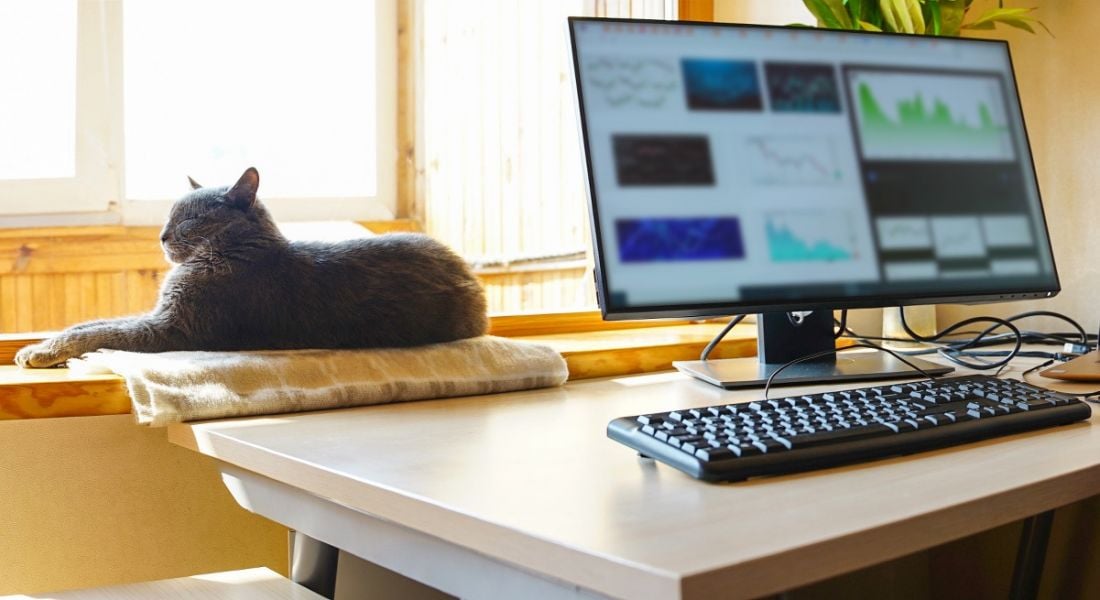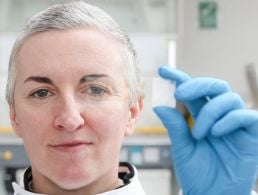Dr Kate Smyth fills us in on how teams from Trinity College Dublin are managing remote work, with advice and support from a leading researcher in wellness at work.
Since Taoiseach Leo Varadkar made his wartime-like speech on Thursday, 12 March, daily life in Ireland has changed significantly, particularly with the most recent restrictions. The Trinity Research and Innovation (TR&I) team, like many of our colleagues, are now working from home. We don’t really have a landline, but we do have Microsoft Teams and Zoom.
Over the last couple of weeks, our team has been putting plans in place so that we can continue to help the Trinity academic community during these difficult times.
Our team did a trial run of working from home just before the closure of the university, so we had a lot of the equipment we needed up and running before the Taoiseach’s announcement: laptops, access to files, various diaries and calendars reminding us what we’d planned to be doing, that sort of thing.
So here we all are now, working from home: the contracts office, the research development office, the office of corporate partnership and knowledge exchange (which includes the technology transfer office, the business development team and Consult Trinity). This is a stressful time, and the Trinity community is under a lot of pressure. We’re all dealing with new and challenging situations.
The pros and cons of working from home
We are all figuring out new technology and software, and learning to hold meetings online. (“Can everyone go on mute?”)
In many ways, we have more time available for focused work. As noted by Camilla Kelly, the research development office’s head of national and international funding: “Working from home upside: no commute.” And we’re all aiming to keep well and keep our families healthy.
According to Dr Joan Cahill – a lecturer from the School of Psychology and principal investigator with the Centre for Innovative Human Systems, whose research focuses on wellness and the workplace – it is important to manage our attitudes to this situation, “to accept change, self-manage, be aware of self and potential stressors, and not avoid our new reality (including the uncertainty that goes with it).”
‘Someone who is experiencing stressful life events may find that he or she is less able to cope with demands and deadlines at work, even though work is not the cause and had never been a problem before’
– DR JOAN CAHILL
Cahill’s work combines philosophy, psychology and technology in exploring how to improve current work environments. She talks about focusing on what French philosopher Henri Bergson described as the “spiritual immune system”. She said that we can achieve “small wins each day”, which can be “in relation to family or work”, and we should take note of these wins and reward ourselves for them. This helps with coping with the current situation.
Looking after the three pillars of wellbeing
Cahill also advised that wellbeing means considering the three wellbeing pillars: the ‘biopsychosocial’.
First is the biological pillar: getting enough sleep (seven to eight hours a night), taking physical exercise, diet and nutrition.
Next is the psychological pillar: not ignoring what is going on, positive self-talk, remembering that the language you use impacts on your thinking and attitudes, accepting the changes and embracing the potential for positives (ie the learning and self-growth that might come with building and practising resilience). Cahill advised that we avoid putting ourselves under pressure to do things perfectly, or to have the capacity to do things as we may have done previously.
Finally, there’s the social pillar: talking with family and friends using video calls, having a virtual coffee with colleagues and sharing experiences, and also managing levels of communication and avoiding being overloaded with pressure to keep in touch.
A key point highlighted by Cahill is that “someone who is experiencing stressful life events may find that he or she is less able to cope with demands and deadlines at work, even though work is not the cause and had never been a problem before”.
Anxious academics
My conversation with Cahill highlighted several issues that Trinity academics may now be dealing with while trying to continue with the teaching and research activities.
According to her, “many are worried about continuity in employment, specifically for researchers and their ability to work on proposals”. There is also “significant concern about ability to do research, such as data collection and conference organisation or attendance”.
Academics are working hard in relation to the “quality of lecture delivery using new online formats, providing clarity to students about assessments and exams, and following up on communications and emails with students”. There is a sense of uncertainty about the “new normal”, including “how much work other people are doing, how other people are adapting to changes, how others are balancing work requirements with family responsibilities, [and] concern about demonstrating that we are working (such as through answering emails)”.
Cahill advised that “being upfront about when we are working and when you are not working takes the pressure off”.
She also sought to emphasise some positives. “We are all in this together – students, academic staff, research staff, administration staff, critical services staff and all the others – and we have common goals.” She noted that Trinity staff “have adapted already – this is a huge positive”.
Dr Kate Smyth is a consultancy development officer at Trinity Research and Innovation.
A version of this article originally appeared on the Trinity College Dublin website.




